South Korea experienced its second space launch failure earlier this month when a rocket exploded shortly after lifting off. In an e-mail interview, Center for a New American Security Fellow Abe Denmark discusses developments and setbacks in South Korea’s space program. WPR: What is the current state of South Korea’s space program? Abe Denmark: To date, the ROK’s satellite development program has been rather successful. Its National Space Program, most recently updated in 2005, calls for an ambitious program including the development of 13 satellites by 2010 and the ability to lift a 1.5 ton satellite into low-earth orbit (LEO) […]
East Asia Archive
Free Newsletter
Turkey’s civil nuclear program has recently gained momentum with a signed deal with Russia to build the country’s first nuclear power plant and talks of a possible $20 billion contract with South Korea for the construction of up to four nuclear energy reactors. In an e-mail interview, Henri Barkey, professor at Lehigh University and visiting scholar at the Carnegie Endowment for International Peace, discusses Turkey’s nuclear ambitions. WPR: What is driving Turkey’s renewed interest in nuclear energy? Henri Barkey: There are three reasons. First, the Iran debate has highlighted how far behind Turkey is on nuclear energy, as there are […]
Last week, Chinese Premier Wen Jiabao and Japanese Prime Minister Naoto Kan held their first conversation on a newly installed prime-ministerial hotline intended to diffuse tensions between the two countries. In an e-mail interview, Haraldur Þór Egilsson, Professor at the University of Akureyri and author of “The Origins, Use and Development of Hot Line Diplomacy” (.pdf), explains the history and current use of diplomatic hotlines. WPR: When were diplomatic hotlines first introduced, and how has their use expanded and evolved? Haraldur Þór Egilsson: The need for reliable and swift communications between governments has always been essential. Such a need was […]
South Korea’s burgeoning civil nuclear industry is gaining increasing international attention, due to a recent $20 billion construction deal with the UAE (which included an additional $20 billion operation and service contract), and potential multi-billion deals with both Turkey and India. In an e-mail interview, Mark Hibbs, senior associate of the Carnegie Endowment for International Peace’s Nuclear Policy program, discusses South Korea’s rise to prominence in the global civil nuclear energy industry. WPR: What is South Korea’s current status in the global civil nuclear industry? Mark Hibbs: South Korea has steadily built up its nuclear power sector over the last […]

After half a century, the revolution in computer technology continues to rapidly transform the world about us. For reasons that are fundamentally economic, the atomic building blocks on which that revolution is based are semiconductor electronic components — chips. It has been estimated that technological improvements in semiconductors accounted for 40 percent to 60 percent of the price-performance improvement in computers in the late 1990s. Those rapid declines in computer prices in turn led to much wider usage of computers and significant improvement in U.S. productivity growth during the same period. The first electronic digital computers used during World War […]
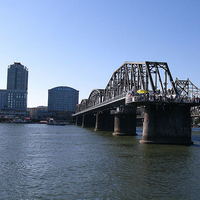
BEIJING — The sinking of the South Korean corvette Cheonan has lent further weight to the argument that Washington’s current North Korea strategy is having little success in controlling the errant communist state. President Barack Obama’s recent National Security Strategy was surprisingly vague on the issue, and the predictable U.S.-South Korean displays of naval strength in the aftermath of the sinking suggest no imminent policy reorientation from the White House. This continued faith in a strategy that has shown no tangible results — described by one analyst as the “definition of insanity” — has been further challenged by recent indications […]
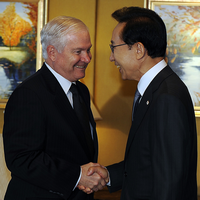
Asia-Pacific nations must renew their efforts to form a coherent and collaborative response to the region’s complex security risks and its inherent potential for instability, senior delegates at a high-level regional forum say. Food and energy security, ethnic conflicts, insurgencies and rising tensions on the Korean Peninsula were key issues discussed at the 9th International Institute for Strategic Studies Shangri-La Dialogue held in Singapore last weekend. Some 320 delegates from 28 nations — including defense ministers, military and intelligence chiefs, and prominent figures from the private sector — attended the summit. North Korea’s unprovoked torpedoing of the Cheonan, a South […]
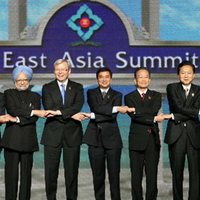
As U.S. President Barack Obama prepares for his visit to Asia in June — one of three potential roundtrips to the region this year — it is worth exploring what Washington’s future policy options are with respect to Asian regionalism. The alphabet soup of the so-called “regional architecture” includes the Association of Southeast Asian Nations (ASEAN), the ASEAN Plus Three (APT), and APEC (Asia Pacific Economic Cooperation), to name just a few groupings. The main question now facing the United States is whether to join the East Asia Summit, a five-year-old body that groups the 10 countries of Southeast Asia […]
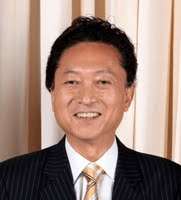
Japanese Prime Minister Yukio Hatoyama and his Democratic Party of Japan rode into power in the fall of last year on the promise of tax cuts and a fresh approach to foreign policy. After a spate of crises less than a year after taking office, Hatoyama’s approval rating plummeted. Last week, a small leftist party allied with the DPJ split from the ruling coalition. On Tuesday, Hatoyama announced he would step down as prime minister. A financial scandal involving DPJ stalwarts partially explains Hatoyama’s fall from grace. Equally vexing for the 63-year-old from one of Japan’s leading political families was […]
France 24 just posted last Friday’s panel discussion program, The World This Week, which I had the pleasure of participating in. The other panelists were Matthew Saltmarsh of the IHT, Paul Taylor of Reuters and Pierre Haski of Rue89.com. We discussed tensions on the Korean Peninsula, Europe’s ongoing economic woes, Jamaica’s unrest, and the Gulf oil spill. Part one is here. Part two is here. One thing I’dd to why the Gulf spill is not comparable to Katrina. In addition to resonating with the President George W. Bush’s troubled relationship with facts and credibility, Katrina also underlined the lack of […]
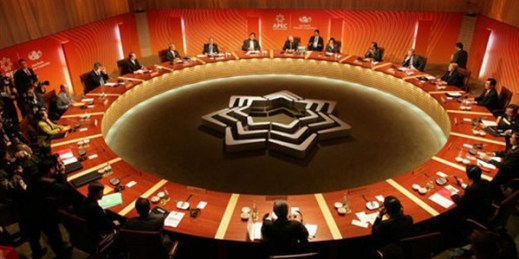
The development of Asian regionalism has been slow, particularly in responding to regional conflicts and the development of a free-trade area. But that should not obscure key advances in regional cooperation. In an article published in the Winter 1993-94 issue of International Security, Aaron Friedberg, a professor at Princeton University, contrasted Europe's "thick alphabet soup" of institutions with Asia's "thin gruel." Some two decades later, no one would now describe Asia's institutional landscape as a thin gruel. It, too, is an alphabet soup of sorts, with names like ASEAN (Association of Southeast Asian Nations), APEC (Asia Pacific Economic Cooperation), APT […]

East Asia in a ‘World of Regions’ East Asia has achieved one of the most profound economic transformations in recorded history. In 1960, the region accounted for only 4 percent of world gross domestic product, but by the 1990s, it had become one of three core economic regions — along with Europe and North America — that together dominated the global economy. East Asia has become the new workshop of the world, the location of fast-emerging markets, and a new financial power in the making. The region now accounts for slightly more than a quarter of world trade, production, new […]
